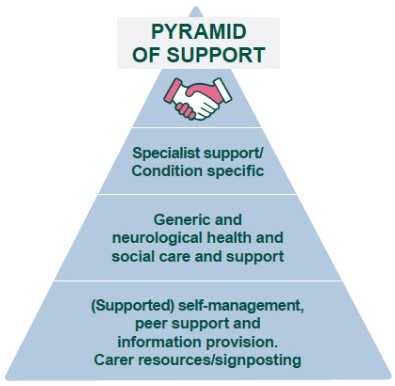Neurological Disorders
Within this strategy neurological conditions refers to all diseases of, or abnormal function of, the brain, spinal cord or peripheral nervous system. The course of a neurological condition can vary, some resolve spontaneously but others recur in episodes, remain the same, progress, or sometimes sadly shorten a person’s life. People with neurological conditions can require varying levels of support and care, dependent on their needs and choices as shown here in the Pyramid of Support.

Whilst there is no clearly defined neurology team there are neurological consultants, specialist advisors/practitioners employed for Multiple Sclerosis, Motor Neurone Disease and Parkinson's Disease and many other committed healthcare professionals, support workers and social and voluntary services. These services work together to provide diagnosis, rehabilitation, care and support to those affected.
At times people with neurological conditions can benefit from support from several services to help achieve what matters to them, manage their symptoms or progress their rehabilitation. The coordination of this can be challenging due to: the lack of a defined local team; many of the key clinicians having part time roles; the absence of some defined care/support pathways; the services involved often having different geographical bases (locally and nationally), electronic systems and managers. There are also multiple possible referral pathways which can be confusing for patients and others seeking services that may best suit their needs.
There is an eagerness and drive amongst clinicians to improve services, and in 2020 and 2021 NHS Orkney clinicians were successful in applying for 2 separate rounds of Scottish Government funding for projects to achieve some of the aims and commitments of ‘The Neurological Care and Support in Scotland: A Framework for Action 2020-25’ (Scottish Government 2019). This framework will continue to be used to guide and support service improvement along with the ‘General Standards for Neurological Care and Support’ (HIS 2019), ‘Clinical Standards for Neurological Health Services’ (NHS QIS 2009).
The views of the people who need, use or deliver the services are critical in determining how we shape services going forward. This needs to be inclusive to ensure that all people with neurological conditions have a voice and equitable access to services and support. There is a realisation that there are gaps in this provision as services stand and work needs to be undertaken to identify these and plan on how these gaps are addressed.
Rehabilitation is a key area for neurological disorders as illustrated in the aim from the Neurological Care and Support in Scotland: a Framework for Action 2020 - 2025 below:
| Many people with neurological conditions experience deterioration in their condition over time. There is a need for a more proactive approach to offering information, care, support and rehabilitation that enables them to maintain their independence, health and wellbeing. There is also a need to develop and test different community based neurological rehabilitation models, that can proactively provide care and support to people with a wide range of neurological conditions. Models may include generic neurology keyworkers, as well as clinicians, social workers and practitioners with advanced skills, and would need to be tested in both rural and urban settings. |